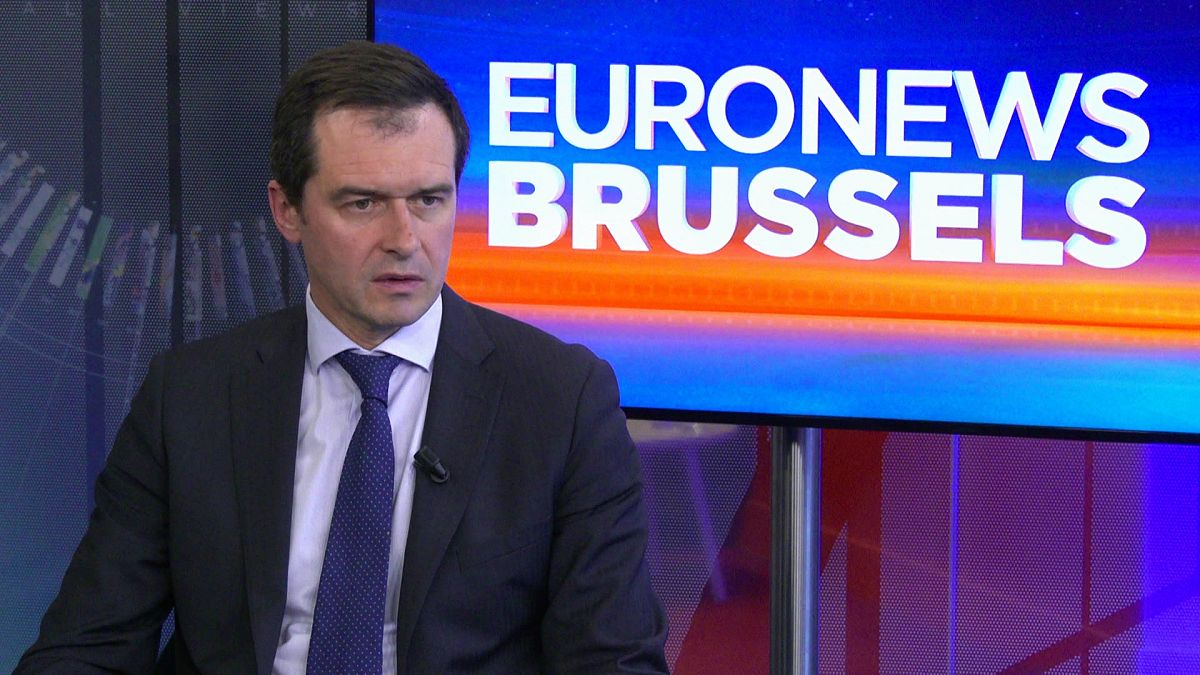In an interview with Euronews, Vsevolod Chentsov says he's disappointed with Hungary for blocking the EU ban on Russian oil.
EU countries should be prepared to make "economic sacrifices" and approve the much-anticipated ban on Russian oil imports, Ukraine's ambassador to EU, Vsevolod Chentsov, has told Euronews.
His comments come in the midst of a diplomatic impasse regarding the proposed oil embargo, the most sweeping and consequential measure unveiled by the bloc since the start of the Ukraine war.
The main point of contention remains the ambitious timeline envisioned by the European Commission: a phase-out of all Russian crude oil in six months and all refined oil products by the end of the year.
Hungary, Slovakia, the Czech Republic and Bulgaria are demanding exemptions in order to have more time to adapt their energy systems and secure alternative providers.
"We think this solidarity, which is declared, should be converted into action. So far, the European Union has been quite united on sanctions. We hope this crisis on the oil embargo will be overcome," Ambassador Chentsov told Euronews' Efi Koutsokosta on Tuesday afternoon.
"We expect decision-makers in Hungary, in other countries, they're human, they understand what's going on in Ukraine. They themselves could see the level of atrocities around Kyiv and other cities. So in order to stop Russia, I think, EU member states should be also ready for certain sacrifices, including economic sacrifices."
Asked if he was disappointed by the stalled discussions, he replied "yes, we are because it's about our common fight against dictatorship, against the aggressor."
"What we would like to avoid is blocking this decision for any other, including political, reasons. This is very important for us," he noted.
'No business as usual with Russia'
"The message is very clear: there will no business as usual with Russia. They need to move fast and to also be very practical and precise [about] what kind of technical solution they need to solve the issue of alternative supplies, and move forward with this package" of sanctions, the ambassador said.
He also upped the ante and suggested the EU's next step should be a gas embargo, an idea that some countries have already ruled out, fearing an inevitable recession. Brussels, however, has unveiled plans to gradually wean the bloc off Russian pipeline gas.
The pressure is on to cripple the Kremlin's ability to finance the invasion: since the conflict broke out, the 27 member states have spent over €24 billion on oil and €34 billion on gas coming from Russia, according to a tracking tool set up by the Centre for Research on Energy and Clean Air (CREA), an independent research organisation.
"What is not less important is to strip Russia of cash because we've heard that this oil embargo, if introduced, will enter into force in a few months, maybe closer to the end of the year, which means that Russia, for this period, will continue receiving huge money from the EU," Chentsov explained, voicing support for intermediary measures like the establishment of an escrow account.
EU sanctions "are effective," he stressed. "Each package of sanctions, it adds pressure, but it's not enough."
Candidate status will be 'serious moral boost'
As the war rages on with no signs of abating, Ukraine has pushed ahead with its bid to join the EU.
The country has recently completed and delivered the second part of the accession questionnaire submitted by the European Commission, which is expected to release its review in June.
Once the opinion is published, it will be up to member states to decide -- by unanimity -- whether Ukraine deserves to be granted candidate status, a moment that will pave the way for a series of long, arduous and highly technical negotiations.
Speaking in Strasbourg on Monday, French President Emmanuel Macron said it will take "decades" for Ukraine to join the bloc. Macron suggested Ukraine and other like-minded countries could join a "parallel European community" to align themselves closer with the EU.
Ambassador Chentsov said Macron's idea, whose details remain scant, should be "studied very carefully" but insisted his country was determined to achieve the coveted candidate status.
"What we need now is granting Ukraine candidate status, because for us it's an existential issue, because the Russian Federation questioned the right of the Ukrainian people to exist, the right of the Ukrainian state to exist," he said.
"Granting the status, for our army, for our people, it will give a very serious moral and psychological boost. It's a kind of recognition of Ukraine as a European country in one family of other European states, and that we are together. It's a symbolic gesture. It's very important political decision."
The ambassador argued Ukraine's resistance and resilience in the face of Russia's aggression proves its readiness to become a fully-fledged EU member and assume all the necessary responsibilities.
"I'm just wondering how many member states now would be able to sustain this pressure [from Russia]. And I don't mean just the capability of their armies. I mean institutional capacity, whether it's the banking system, the financial system, social systems, transport system, if they would continue to operate under such a circumstance," Chentsov said.
"It's a sign also of our maturity as a country and a society to withstand pressure, to learn fast, to adapt. And I I'm sure that we are fast learners. We can move forward."
